
Every month there are over 1.3 million searches for “lawyers near me” on Google. Law firm SEO services are essential to drive qualified traffic to your website through targeted strategies including local SEO, content marketing and technical SEO.
These will help your firm get noticed in the competitive legal landscape and get more client leads and conversions.
According to IBISWorld the legal services industry in the US generates $330 billion in 2023, individual and corporate demand.
This guide will show you how to get your law firm website to rank higher on Google, Bing and Yahoo and get more clients through SEO.
What is Law Firm SEO?
Law Firm SEO is the process of getting your law firm website to show up on search engines like Google and Bing. The goal is to rank your website pages for relevant keywords on the search engine results pages (SERPs) so potential clients can find your services easily.
Unlike paid advertising, Law Firm SEO is all about organic (unpaid) search results. This involves a series of strategic efforts to get your law firm visible in relevant search queries.
Key SEO tactics include publishing informative blog posts that answer client questions, speeding up your site for a better user experience and getting positive reviews on Google to build trust and credibility.
With the right SEO strategy you can get higher rankings in search results and drive more organic traffic to your website.
This in turn can lead to more client leads and overall success of your practice.

Why is SEO for Law Firms Important?
SEO is important for law firms because it directly affects your ability to get high quality leads. When your law firm website is at the top of search engine results pages (SERPs) you become more visible to potential clients who are actively looking for legal services. This increased visibility is a key to getting more clients to your practice.
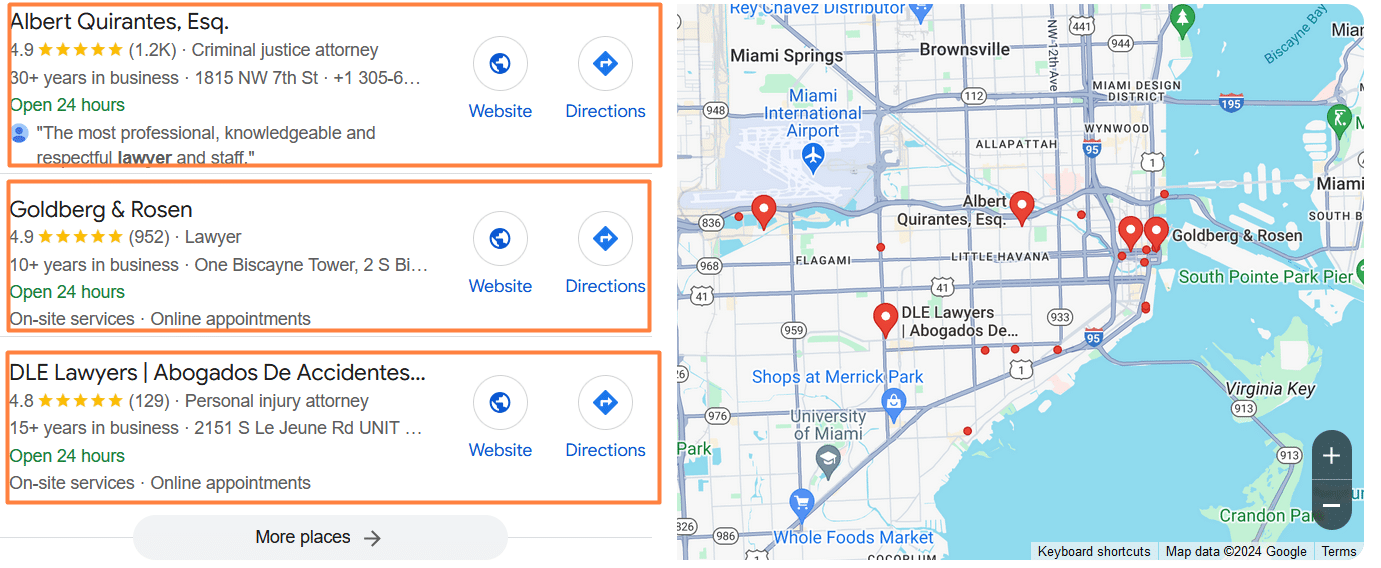
But SEO is not a one time solution; it’s a long term strategy to get and maintain top rankings. Over time this ongoing effort will give you continuous visibility for your law firm so your services will always be available to those who need it.
Benefits of SEO for Law Firms:
- More Online Visibility: Be at the top of the SERPs and more people will see your law firm.
- More Clients: SEO drives targeted traffic to your site and more inquiries and clients.
- Cost Effective Marketing: Organic results are cheaper than paid ads.
- Credibility: High search rankings build credibility and trust.
- Competitive Edge: A good SEO strategy helps you stand out from the competition.
- Long Term Results: A well maintained SEO strategy means long term visibility and client acquisition.
By investing in SEO, you can increase your law firm online presence and client acquisition rates. This is especially important in today’s competitive legal world where being at the top of the search results can mean the difference between winning or losing a client.
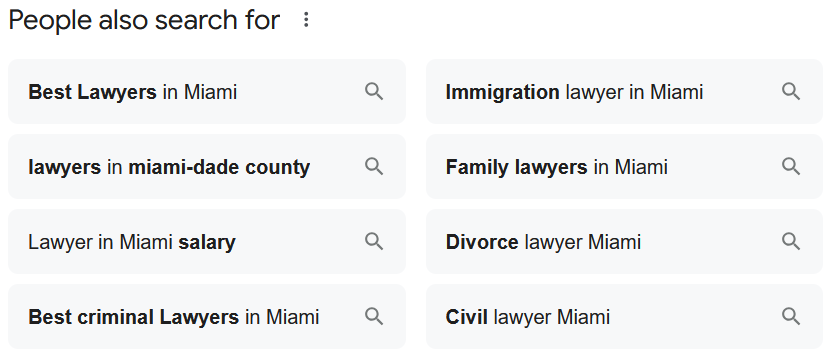
Does SEO Work for Lawyers?
SEO has been proven to work for law firms with high ROI and long term results. As the legal industry goes online the ability to rank in the search engines can make or break a law firm.
Lawyer SEO is about strategies that appeal to legal consumers who start their search for legal services online.
High Conversion Rates: Law firms that invest in SEO see a significant increase in conversion rates. According to the American Bar Association a law firm that ranks in the top 3 on Google can get conversion rates of 25-30% from organic traffic.
Targeted Traffic: SEO drives targeted traffic—people who are looking for the legal services you offer. Targeted traffic means the traffic coming to your site is more likely to convert into actual clients.
ROI of SEO in Legal Marketing
The ROI of SEO for law firms can be huge if done right. Unlike paid ads which offer immediate but short term visibility, SEO offers long term visibility and client acquisition.
Long Term Investment: SEO is a long term investment. It takes time to see results but the results are sustainable and continue to generate leads long after the work is done.
Cost Effective: SEO is more cost effective than traditional marketing and paid advertising. A report from Legal Marketing Association says law firms can see an average ROI of 200-300% on their SEO investment over 2 years.
Case Studies of Successful Legal SEO Strategies
Several law firms have used SEO to grow their practice. For example:
Case Study 1: A mid-sized law firm specialising in personal injury cases implemented a local SEO strategy focusing on content and building high quality backlinks from legal directories. Within 6 months their website traffic increased by 150% and client inquiries by 35%.
Case Study 2: A boutique law firm specialising in intellectual property law used content marketing and on-page SEO to rank for competitive keywords. They ranked top for terms like “patent lawyer in New York” and saw a 40% increase in organic traffic and 25% increase in new clients.

How to do SEO for Lawyers
When doing SEO for lawyers or law firm website it involves a combination of strategies to increase visibility, attract potential clients and make your firm stand out in search results. Here are the strategies to implement:
Local SEO for Law Firms
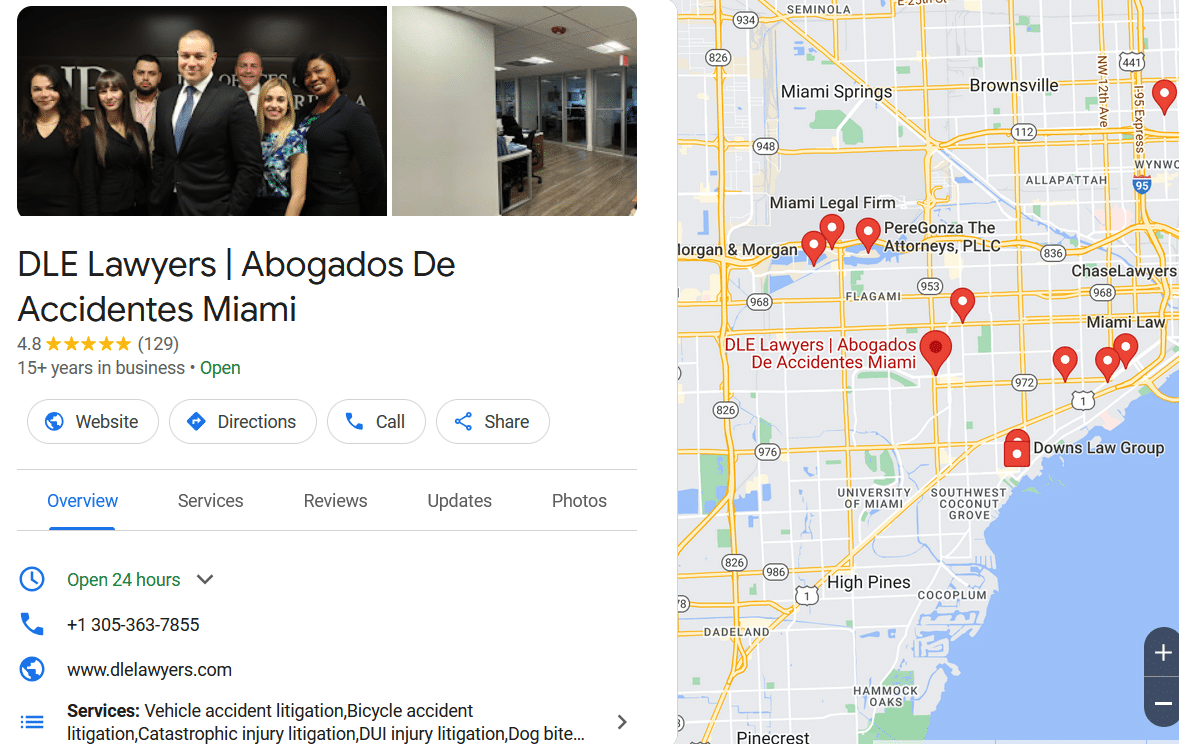
Getting more leads and clients starts with increasing your local search visibility. Ranking top of search results especially in the Google 3-Pack is key for law firms.
According to a survey by Lawyer Monthly 45% of respondents said they would use Google to find a lawyer, 34% would ask for recommendations online.
By doing local SEO your law firm can also get a Knowledge Panel—a feature where Google aggregates data from multiple sources to provide information about your firm and boost your credibility and help potential clients find you easier.
Here are the SEO tactics to implement for local SEO for lawyer or law firm website:
Claim or Optimize Your Google Business Profile
Claiming or optimizing your Google Business Profile is a must for law firms who want to increase their local search visibility. This is your law firm’s local listing on Google and appears in search results for local or branded queries.
According to a survey 65% of respondents said that reviews from former clients were an important factor in their hiring decision .
How to Claim and Optimize GMP
- Go to GMP website and sign in with your business email.
- Search for your law firm to see if a profile already exists. If it does claim it; if not create a new profile.
- Fill up all the required information including business name, address, phone number and website. Make sure these details are consistent with what’s on your website and other directories.
- Verify your business through the verification process which is usually done via a postcard sent to your business address.
- Put local SEO keywords naturally in your business description and services section.
- Add high quality photos and videos of your office, team and services to make your profile more appealing.
- Specify the areas your law firm serves so your profile will appear in local searches relevant to your service area.
- Encourage satisfied clients to leave reviews on your profile to build trust and attract more clients.
- Update your profile regularly with current information such as business hours, special services and new offerings.
Build Citations in Legal Directories
Building citations in legal local directories is a part of local SEO for law firms. Consistent and accurate citations will increase your law firm visibility in local searches and help establish your firm’s online credibility.
Citations are online mentions of your law firm name, address and phone number (NAP). These are important for SEO as it helps search engines to verify your business existence and legitimacy which can boost search engine rankings.
Citations is a part of off-site SEO as it’s a form of link building that boosts your firm’s online authority
Here’s how to build citations for your law firm:
- Find important legal directories where your law firm should be listed, like Avvo, FindLaw, Justia and Lawyers.com.
- Go to each directory’s website and enter your law firm’s NAP information following their instructions.
- Check your listings often to make sure all the information is still correct especially if anything changes like your phone number or office location.
- If the directory asks for verification follow the steps they give to confirm your information.
- Keep a simple list of all the directories where you submitted your law firm’s information including usernames, passwords and submission dates so you can update easily in the future.
- Every few months review your citations in each directory to make sure everything is still accurate and consistent.
Consider hiring a Law Firm SEO Company to manage and optimize your citations across directories.
Use Local Schema Markup
Local schema markup is part of any law firm SEO strategy. Schema markup helps search engines to understand the specific details of your law firm like location, services and contact information.
Structured data will boost your SEO efforts and increase your visibility in Google search results and organic search.
When you use local schema markup it directly affects your SEO ranking factor by making it easier for search engines to understand your website content.
How to Implement Local Schema Markup in Law Firm Websites :
- Identify the relevant schema types for your legal website, like LocalBusiness, Attorney or LegalService.
- Use online tools like Google’s Structured Data Markup Helper or Schema.org to generate the schema code.
- Make sure you have accurate business information like your firm’s name, address, phone number and business hours to include in the schema markup.
- Embed the generated schema code into the HTML of your website, preferably in the header or footer for consistency.
- Validate the schema markup using Google’s Rich Results Test or Schema.org’s validator to make sure there are no errors.
- Update the schema markup whenever you change your business information or services.
- Monitor the schema markup through Google Search Console to see how it affects your search visibility and make adjustments as needed.
Ask for Client Reviews
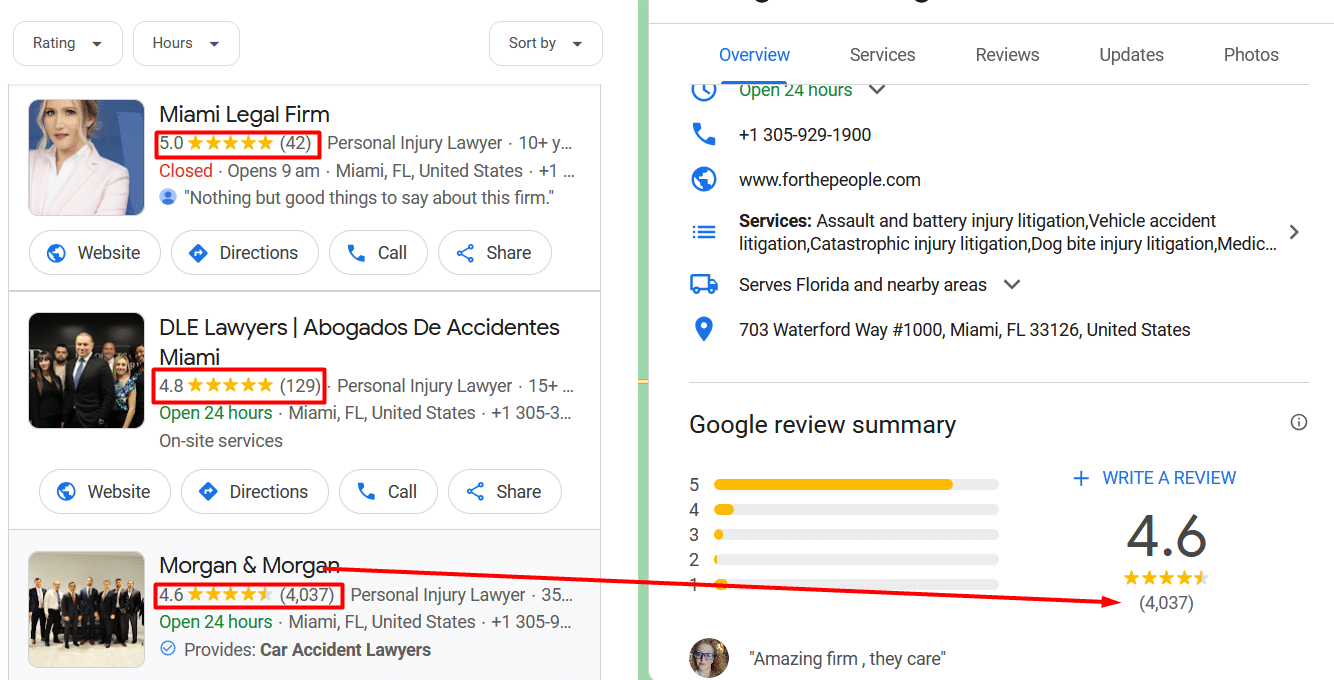
Asking for client reviews is part of a successful law firm SEO. Positive reviews not only boost your firm’s reputation but also increase your visibility in local search results and improve your search engine ranking.
Here’s how to ask clients to leave reviews:
- Ask at the Right Time: After you’ve resolved a client’s case ask them if they would be willing to leave a review. Timing is key because clients are more likely to provide positive feedback when they’re satisfied with the service.
- Make It Easy: Provide clear instructions on how to leave a review. You can send a follow-up email with a direct link to your law firm’s Google Business Profile or another review platform.
- Give Guidance: Some clients may not know what to write so give them a few suggestions on what to include, like their experience with your services and how your law firm helped them.
- Follow Up: If a client agreed to leave a review but hasn’t done so after a few days send a polite reminder. This shows you value their feedback and helps them follow through.
- Respond to Reviews: Always respond to reviews, whether positive or negative. Thank clients for their feedback and address any concerns in negative reviews. This not only shows you’re engaged but also builds trust with potential clients.
- Show Off Reviews: Display client reviews on your website and social media profiles. This not only showcases your success stories but also encourages others to share theirs.
Optimize Your Law Firm Website for SEO
Optimizing your law firm’s website for SEO is key to improving online visibility and attracting more clients.
A optimized website ranks higher and is smoother to use, for converting visitors into clients.
Focus on legal SEO by making sure your site is mobile friendly. Many users search for legal services on their mobiles, a mobile friendly law firm website is essential.
Google likes mobile friendly sites, affects your rankings.
And speed up page load time. Fast sites give better user experience, lower bounce rates and better search engine rankings. These are key to making your site work.
Here are the On-Page SEO strategy to implement for SEO for law firm website:
Do Mobile Responsive
Making sure your law firm website is mobile friendly is key to SEO success. In today’s digital world more potential clients are searching for legal services on their mobiles, so your site needs to be accessible and functional across different screen sizes.
Using responsive design principles is the key to making a mobile friendly law firm website. This means using fluid grids, flexible images and media queries so your site can adapt to different devices.
A mobile first design means your site is not only user friendly but also loved by search engine bots which can improve your law firm SEO rankings.
To make sure your site is fully mobile friendly start by testing it on different devices. Use Google’s Mobile Friendly Test to find out what needs to be fixed.
Mobile responsiveness will increase your law firm’s visibility and user experience, get better results from your SEO efforts.
Working with an SEO agency will ensure your site meets all mobile optimization standards, setting you up for long term SEO success.
Improve Page Load Speed

Speeding up page load is good for user experience and SEO ranking factors. A fast loading page keeps potential clients engaged and affects your site’s organic traffic.
Slow sites can annoy users and increase bounce rates which can hurt your overall lawyer SEO.
To speed up page load start by focusing on Core Web Vitals which are the metrics Google uses to measure user experience.
Methods like compressing images, enabling browser caching and minimising JavaScript can make a big difference.
Use free tools like Google’s PageSpeed Insights to measure your site’s speed and find out what needs to be fixed.
Remember technical SEO is key to fast loading times which affects your law firm’s visibility in search results.
Many law firms work with a law firm SEO agency to make sure their site is fully optimised for speed, setting up for SEO success.
Enhance User Experience (UX) Design
Good UX is becoming a key factor in SEO. Google watches how long users stay on your site and rewards longer visits with better rankings.
A good law firm UX design means visitors can find their way around your site, leading to higher satisfaction and retention.
These affect metrics like bounce rate and click through rate which are important for SEO. UX for lawyers means creating a layout that is visually pleasing and functional so users can find what they need quickly.
- Users should be able to find attorney bios, practice areas and contact forms in one click.
- Put calls to action like “Schedule a Consultation” on all pages.
- Display testimonials, case results and awards prominently.
- Use eye catching elements like bold graphics or images.
- Keep your homepage clean by removing unnecessary content.
- Prioritise key content and calls to action above the fold.
Fix Technical SEO
Technical SEO issues can hurt your law firm’s search ranking. Making sure your site is optimised for search engines and user experience is key. Understanding crawlability and site structure can make a big difference to your site’s visibility and performance.
Fix Technical SEO on your law firm website :
- HTTPS: Make sure all pages are on HTTPS for secure connections and better rankings.
- Indexing and Crawling: Check regularly that important pages are being indexed and crawled by search engines.
- Heading Tag Hierarchy: Keep your headings clear and logical so users and search engines can understand your content.
- Broken Links: Find and fix links pointing to non-existent URLs to avoid user frustration and efficient crawling.
- Slow Page Speed: Optimize your site’s Core Web Vitals to speed up page load, slow sites hurt user experience and rankings.
- Duplicate Content: Remove or revise duplicate content to stop wasting Google’s resources and weakening your SEO.
- Missing Meta Tags: Make sure every page has a unique and descriptive title tag and meta description to increase visibility.
- Sitemap (HTML and XML): Keep your sitemap up to date to help search engines navigate your site.
- Robots.txt Errors: Fix any errors in your robots.txt file to tell search engines which pages to crawl.
Content Strategy for Legal Websites
To rank your law firm’s website for target keywords, your content strategy should focus on creating high quality, optimized content that matches user search intent so your site meets the needs of potential clients.
Create Informative Practice Area Pages
To create a helpful practice area page start by focusing on a specific area of law your firm practices. Instead of a general “Practice Areas” page consider having separate pages for topics like “Brain Injury Lawyer” or “Divorce Attorney.”
This approach not only improves your website’s SEO by targeting relevant keywords but also makes it easier for potential clients to find exactly what they’re looking for.
To create practice area pages for law firms:
- Focus on one legal topic per page for clarity and SEO benefits.
- Use a clear URL structure with keywords, e.g. /practice-areas/personal-injury.
- Describe services in detail, answering client questions.
- Add client testimonials and case studies to build trust.
- Optimise with keywords like “Personal Injury Lawyer Near Me” and “Truck Accident Lawyer”.
- End with a clear call to action to contact the firm.
- Use structured data and schema markup to increase visibility in search engine results.
- Add original images and make sure they are tagged with relevant keywords.
- Interlink related practice area pages to create a rich internal link structure for SEO.
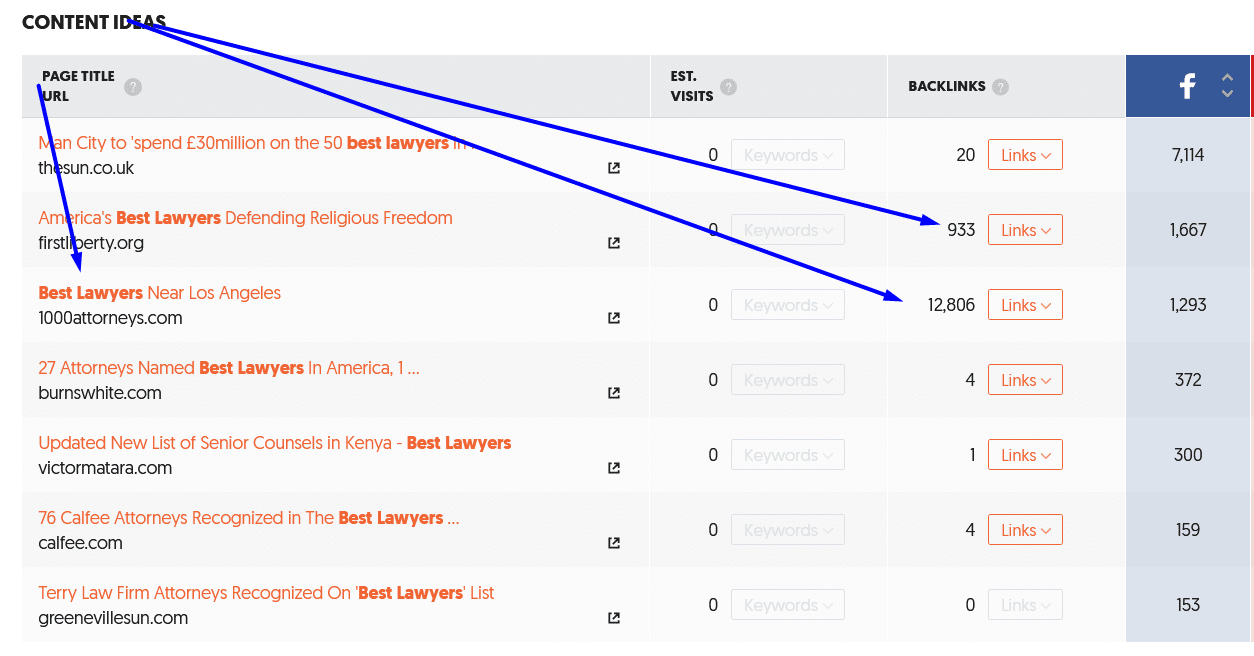
Create Location-Specific Pages
To create location pages for law firms start by tailoring each page to the unique aspects of the area you serve, using local keywords and search terms.
This not only improves local SEO but also increases user engagement by addressing the specific legal needs of clients in those areas.
For example if your firm serves multiple cities you should have a dedicated location page for each city, e.g. “Personal Injury Lawyer in Chicago” or “Estate Planning Attorney in Miami”. This way when users search for legal services in their area your firm will show up in the search results.
Use a clear URL structure, include local keywords and client testimonials to build trust and drive local traffic.
- Keyword research for each location.
- Dedicated landing pages with unique content for each area served.
- Local maps and contact information.
- Regularly updated content.
- No duplicate content to avoid SEO penalties.
Create Advice, Ask The Expert, and Blog with Legal Insights
To create blog content for law firms focus on legal insights that will resonate with your audience.
Organize your posts around common legal questions or concerns and position your firm as the expert.
Adding legal insights to your blogging strategy makes the content richer and more relevant. Update blogs with expert advice regularly to show ongoing expertise and keep readers interested.

Create Lawyer Bio Pages
Lawyer bio pages are key to building trust and authority. These are often the first impression potential clients have of an attorney so make sure you get them right. By focusing on SEO, relevance and user engagement you can create bio pages that stand out and resonate with your audience.
How to Create Lawyer Bio Pages that Stand Out
- Highlight Expertise: Clearly state your areas of practice, experience and achievements. Use keywords naturally to optimize for SEO.
- Professional Tone: Write in a professional tone but still accessible and engaging.
- High Quality Photos: A professional head-shot can add a personal touch and help build trust with potential clients.
- Client Testimonials: Add brief and impactful testimonials to increase credibility and social proof of your expertise.
- Link to Relevant Content: Link to case studies, blog posts or legal articles that demonstrate your expertise and increase user engagement.
- Awards and Recognition: List any awards or recognition to further establish your authority and credibility in your field.
- Experience Section: A summary of your career including years of practice, significant cases and relevant experience.
- Educational Background: Your educational qualifications including law school and any additional certifications to show your legal foundation.
- Area Served: Specify the area you serve so potential clients in your area can find and connect with you.
- Regularly Updated: Keep the bio current with recent achievements, case wins or changes in your practice area so it remains relevant and authoritative.
Keyword Research and Implementation
Keyword research is key for law firms to get online visibility. Implementing the right keywords can boost search rankings, get local clients and drive valuable traffic.
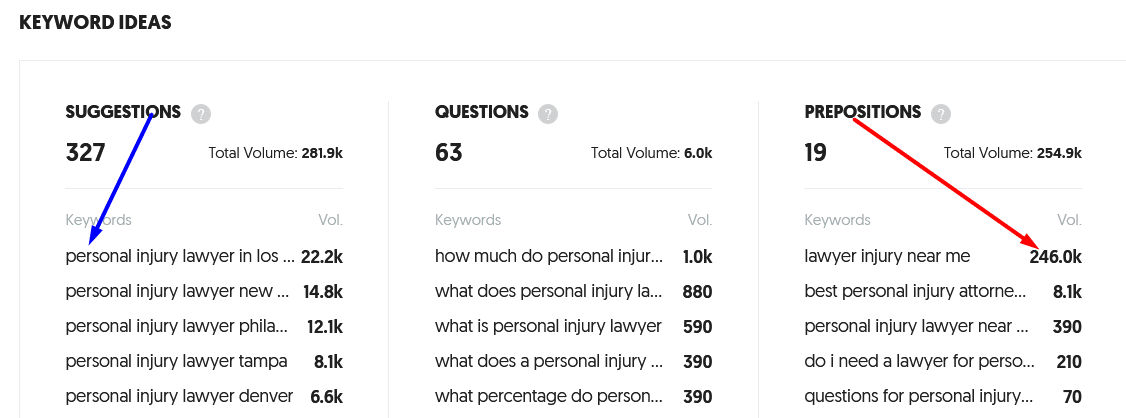
Identify Local Keywords
For law firms local keywords are everything. Start by researching what your potential clients in your area would search for, for example “Employment Lawyers Near Me” or “Employment Lawyers in New York” Use Google Keyword Planner and Moz to find local keywords. These keywords should match your practice areas and specific locations.
Local search intent means knowing what your potential clients are searching for online. By knowing this you can target keywords that match their needs and make your firm easier to find. This is how you attract clients who are ready to hire a lawyer in your area.
Use Ahrefs, SEMrush and Google Trends to find trending local keywords. Analyze your competitors’ keywords and use geo-specific terms to make your content more relevant to local searches.
Add Keywords into Content and Meta Tags
Add keywords like “Employment Lawyer in New York City” to your content. Start with the title, headers and first paragraph. Don’t over optimize by using keywords in a way that feels unnatural and doesn’t make sense to the reader.
Meta tags are important for SEO. Add target keywords like “NYC Employment Law Laywers” to your meta titles and descriptions. Make them compelling to increase click through rates. Make sure each page’s meta tags are unique and relevant.
To stay relevant update your content and meta tags with new keywords. This keeps your site aligned with user search intent and will improve search rankings over time. Use SEMrush and Ahrefs to find the best keywords for your content.
Answer User Queries with Relevant Content
Creating content that answers legal questions is crucial for law firms to engage with potential clients and SEO. Start by finding out what your clients are asking, for example “How do I file a personal injury claim?” Use these questions to create blog posts, FAQ sections or articles that answer these questions directly.
To make sure your content matches what users are searching for, understand the search intent – informational, transactional or navigational. Add keywords naturally, for example “Content for legal FAQs” and “User query content strategy for law firms” to make it more relevant and search engine friendly.
Step-by-Step Guide:
- Find Common Questions: Research what your clients are asking or what’s being searched online. Use Semrush and Google’s “People also ask” to find out.
- Keep it Simple: Write in plain language. Don’t use legal jargon unless you have to.
- Organize Content: Use clear subheadings and short paragraphs. Make it easy for the reader to find what they need.
- Add Examples: Real life examples can help explain complex legal concepts in simple terms.
Link Building for Law Firms
Link building is important for law firms to increase online visibility. By getting high quality backlinks firms can improve search rankings, attract clients and establish themselves as authorities in the legal industry.
Obtain Backlinks from Authoritative Legal Sites
To get legal backlinks from authoritative sites, focus on building relationships with other legal sites. Reach out to well known legal blogs, industry publications and professional organizations. Offer to write guest posts or provide expert insights and make sure you link back to your site.
Backlinks from authoritative sites are important for your site’s search rankings. Search engines trust links from trusted sites because they mean credibility and relevance.
For example a backlink from a high authority legal journal can boost your website’s ranking and make it easier for potential clients to find you online.
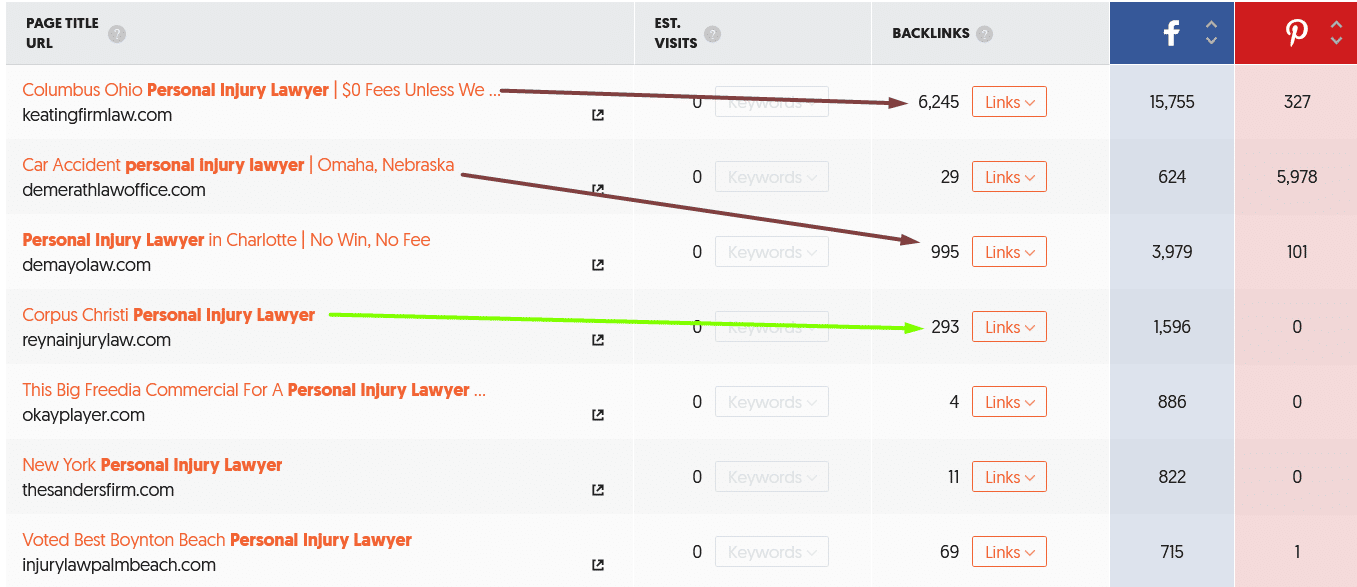
Quality Over Quantity in Link Building
In link building quality is key. A few high quality backlinks from reputable sites are worth more than many low quality ones.
Search engines like Google trust links because they mean your content is trustworthy and relevant.
For example a single backlink from a well known legal site can have more impact on your rankings than dozens of links from lesser credible sources.
To find high quality link opportunities focus on sites with high domain authority and relevance to your practice areas. Use tools like Moz and Ahrefs to find these sites.
Look for legal blogs, industry publications and professional directories that are respected in your field.
Using low quality or spammy links can harm your SEO. Search engines may penalize your site and reduce your visibility in search results.
This can lead to a big drop in traffic and potential clients. Avoid links from irrelevant or suspicious sites as they can do more harm than good.
Advanced SEO Strategies for Lawyers
Voice Search Optimization

With the rise of smart speakers and voice assistants voice search is important. Focus on using conversational keywords and phrases like “How can I get a quick divorce”. Structure your content to answer common legal questions directly as voice searches often look for quick and concise answers.
Voice search queries are more natural and question based. Including these conversational keywords in your content increases your chances of ranking in voice search.
For example instead of “lawyer services” use phrases like “What services do lawyers offer?”
Voice search is changing how people find legal services. Law firms optimized for voice search can capture more local and mobile traffic and get more visibility and client inquiries.
Artificial Intelligence and SEO
AI is changing SEO by making keyword research and content creation better. Tools powered by AI can analyze big data to find trends and opportunities fast. Use AI driven tools for “Advanced legal SEO” to optimize your content.
AI is automating processes from keyword research to content optimization. It’s making SEO strategies more targeted and effective so your law firm can stay ahead of the competition.
Many law firms use AI to improve their SEO from content creation to predicting search trends.
Local Service Ads (LSAs) for Lawyers
Local Service Ads are a powerful way for lawyers to reach local clients. These ads show up at the top of search results and connect potential clients directly to your firm.
To set up LSAs create a profile that shows your services, location and reviews. Update your profile regularly and monitor your ad performance to get the best ROI.
LSAs give you high visibility in local searches and help you get more clients. They are cost effective as you only pay for leads that contact your firm directly.
By optimizing your LSAs you can improve your firm’s online presence and get more qualified leads to your practice.
Tracking and Measuring SEO Success for Law Firms
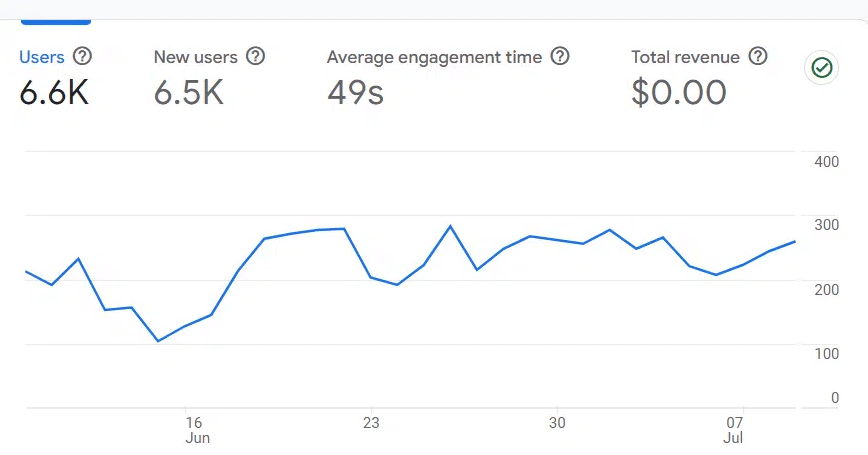
Use Google Analytics and Search Console
To measure your law firm’s SEO start by setting up Google Analytics and Search Console. These tools give you the insights you need into your website.
Use Google Analytics to track traffic and Search Console to see how your site shows up in search results. Both tools are key to understanding your audience and refining your SEO.
Focus on metrics like organic traffic, bounce rate and conversion rate. Organic traffic is how many visitors find your site through search engines.
A high bounce rate means your content isn’t engaging enough, conversion rate is how well your site converts visitors into clients.
Track Keyword Rankings
Tracking keyword rankings is key to measuring your SEO success. By tracking how your target keywords perform over time you can see how effective your content and SEO is.
Use tools like Ahrefs, SEMrush or Google Search Console to track keyword performance. These tools show you where your site ranks for specific keywords so you can see trends and areas for improvement.
Analyze User Behavior and Conversions
Metrics like time on page, pages per session and bounce rate give you insight into how users are interacting with your site.
Longer time on page and more pages per session means visitors are finding your content engaging. A high bounce rate means users aren’t finding what they need.
Conversion tracking is key to measuring SEO success. Analyze where users drop off in the conversion process and make changes to improve it.
For example simplify contact forms or improve page load times to increase conversions.
Common SEO Mistakes to Avoid for Law Firms
Ignoring Local SEO
Local SEO is key for law firms to reach local clients. Ignoring local SEO means missing out on local search results.
For example not optimizing your Google Business Profile or not including local keywords means you’ll show up lower on Google Maps and local search engine results pages.
One of the biggest mistakes law firms make is ignoring local SEO. This includes inconsistent NAP (Name, Address, Phone Number) information, not claiming local business listings and not doing local keyword research.
To fix these issues make sure your NAP is consistent across all platforms, claim your Google Business Profile and focus on relevant local keywords.
Keyword Stuffing and Over-Optimization
Keyword stuffing is when too many keywords are crammed into content making it unreadable and ineffective. Search engines punish this so you get lower rankings.
For example overloading a blog post with “law firm SEO” repeatedly will harm your SEO.
To avoid over optimization keep your content natural. Use synonyms and related terms instead of repeating the same keywords.
Tools like Yoast SEO will help you check keyword density and keep it within a healthy range.
Ignoring Technical SEO
Technical SEO is the base of a solid SEO strategy. It’s optimizing the back end of your website so search engines can crawl and index your site properly.
Ignoring technical SEO can mean slow page load times, broken links and poor site structure all of which can harm your rankings.
Common mistakes include not optimizing site speed, not having XML sitemaps and not looking at core web vitals.
These will prevent search engines from indexing your site and reduce visibility in search engine results pages.
Use Google Search Console and SEMrush to audit your site for technical SEO issues. Update your XML sitemap regularly and submit it to search engines.
Focus on core web vitals like page speed and interactivity to improve user experience and search rankings.
Latest Blogs


Google Search Ranking Volatility in April 2025: Day-by-Day Breakdown







